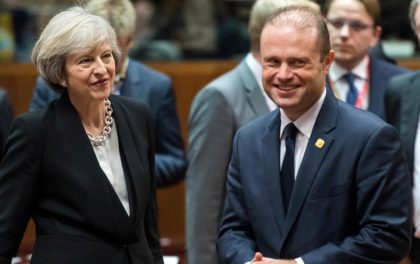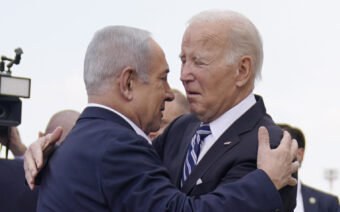
LONDON (AP) — Is it cod or haddock? That’s the sort of question that will matter to Britain if it leaves the European Union’s tariff-free single market and ends up operating under rules overseen by the World Trade Organization.British Prime Minister Theresa May(Photo)speaks with Malta’s Prime Minister Joseph Muscat, during a round table meeting at an EU Summit in Brussels . Muscat the leader of the European Union’s smallest nation warned Britain on Wednesday Jan. 11, 2016 that it can only lose by leaving the EU and that no member state is likely to break ranks and negotiate with London until it has departed.
Norway comes closser
Brexit and implications for Norwegian fishing interests is on the agenda when Minister of Fisheries Per Sandberg meets his British counterpart George Eustice in London january 25 th . and 26th. Theresa May and her government are meeting the Norwegian minister of Fishery before Brexit comes with possible new tarriffs on trade between EU and Great Britian. THis could gain Noregian fisheries, reports Nordic News.
– Britain is our fourth most important market for fish. Britain’s national dish fish & chips are totally dependent on Norwegian cod and haddock. I am concerned that we get at least as good for Norwegian fish to the UK as we have today, says Per Sandberg. Allocation of fishing quotas is an equally important issue. Brexit mean that Norway-UK, Norway-EU and UK EU must agree on fisheries management and quota issues in the public areas in the North Sea and other areas where the three parties have fisheries.
Hard Brexit possible
A complete divorce, often referred to as «hard Brexit,» would see the EU impose tariffs on an estimated 15,000 goods, in no uniform way: some British exports, like pharmaceuticals, would face no extra charge but the large majority would.How big the tariffs are will depend on a complex series of factors. So cod and haddock may sit side by side in your average British «fish and chip» restaurant but they are classified differently by the EU — cod would be slapped with a 12 percent tariff and haddock 7.5 percent.And the list goes on and on. According to a recent analysis from Civitas, a London-based economic think tank, the average tariff on British exports to the EU under WTO rules would be around 4.5 percent.It’s a scenario that many experts, including from the ranks of those who backed Britain’s departure in June’s referendum, say would be a worst case scenario for British businesses. That’s why the pound has fallen any time Prime Minister Theresa May’s comments point to such an outcome. The response to her Brexit speech on Tuesday will be interesting. The issue is heating up as May plans to start by the end of March the formal talks to leave the EU. German Chancellor Angela Merkel and other EU leaders have repeatedly warned Britain cannot retain access to the single market if it wants to control the immigration of EU citizens. May’s repeated focus on the need to control borders suggests Britain won’t be able to remain a member of the single market.
EU has limits on foods
Britain would trade on the rules devised and policed by the Geneva-based WTO, which has 164 members and is responsible for the vast majority of global trade. Under WTO rules, Britain would not be able to trade with its former EU partners on terms that would be any more advantageous than other countries that do not have trade agreements with the EU, such as the United States. Most British exports to the EU would be subject to the EU’s Common External Tariff, or CET, meaning that — all other things being equal — most British goods would instantly become less price-competitive in the EU.Goods coming into Britain from the EU would also be subject to tariffs, suggesting the sides would be inclined to agree on a new trade deal to lower the tariffs again. Free trade deals typically take years to negotiate, though. It’s not just about tariffs. Certain standards and regulations would still have to be met by British businesses if their products are going to make it to the European marketplace. The EU has limits on foods containing genetically-modified products, for example.
Fall in national income
Under WTO rules, Britain’s trade relations would closely resemble those that currently exist between the U.S. and the EU.
The two sides trade under conditions that the WTO describes as «most favored nation» status. It facilitates some trade but does not eliminate tariffs across the board. So U.S. motor vehicle manufacturers pay a 10 percent tariff on most passenger cars. But minibuses can face a 16 percent charge while snowmobiles are slapped with only a 5 percent tariff. It’s the same complicated story across other sectors: there are about 15,000 different classification codes for goods. Tariffs on fish would vary not only depending on the species but also whether it’s traded alive, fresh, frozen or filleted. While the WTO option ensures that Britain gets back control of its borders and regains its ability to set regulations and taxes, many critics say it would diminish the country’s trade and lead to bigger falls in national income than other Brexit scenarios. Philip Hammond, Britain’s treasury chief, has said the WTO option would «not be the most favored outcome.» And since services are not regulated by the WTO, Britain’s crucial financial services could be seriously hurt because professionals would lose the automatic right to work anywhere in the EU.
Goods more competitive
Many pro-Brexit campaigners think there’s nothing intrinsically wrong with the WTO option, arguing that a proper cost-benefit analysis should include the boost that a newly sovereign Britain could get from trade deals with non-EU countries. They also say that the WTO option would be far better than a transitional deal that would extend the current bout of uncertainty.
Britain, they add, could also take a global lead in reducing tariffs to lower costs for its businesses. The downside on that, though, would be that the same firms would face more intense competition in the British marketplace. Chinese steel, for example, is cheaper than steel produced in Britain.Also, Brexit supporters note that the fall in the value of the pound provides a natural cushion by making British goods more price-competitive in the international marketplace, even with new tariffs.
As with most things Brexit-related, there are many legal uncertainties even with the so-called WTO option.Britain would possibly have to reapply to enter the WTO as its membership is currently invested through the EU itself. WTO chief Roberto Azevedo has said that Britain’s renegotiation of its membership would be relatively straightforward, writes Associated Press supplied with information from Nordic News.




